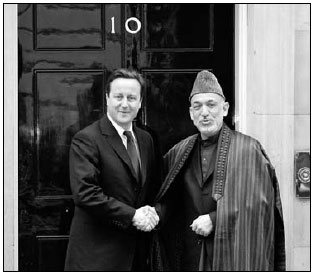Europe
US-Taliban talks needed to end war
Updated: 2011-03-03 07:45
By Myra MacDonald (China Daily)
|
British Prime Minister David Cameron (left) greets Afghan President Hamid Karzai as he arrives for a meeting at 10 Downing Street in London on Tuesday. Sang Tan / Associated Press |
LONDON - The United States must hold direct talks with the Taliban if it is to have any hope of ending the Afghan war, an influential British parliamentary committee said on Wednesday.
The Foreign Affairs Committee said the military campaign was not working and urged the British government to use its influence in Washington to convince it to engage fully in direct talks with Taliban leaders.
"An Afghan-led but US driven, process of political reconciliation is the best remaining hope that the UK and others have of achieving an honorable exit from Afghanistan," the report, based on interviews with experts and officials, said.
The UK and the United States have long stressed the need for a political settlement in Afghanistan. But officials have also said any talks must be Afghan-led, and insisted military pressure is helping bring insurgents to the negotiating table.
The report, however, argued the Afghan government led by President Hamid Karzai did not have the clout to negotiate a settlement without the direct involvement of Washington.
"All of those from whom we took evidence were convinced that the US's direct endorsement of, and participation in, talks was essential if a peace settlement is to be brokered ... ."
It said that while the military campaign might be achieving tactical successes, the overall security situation remained precarious. Current tactics might even reduce chances of a settlement by raising mistrust and radicalizing the insurgency.
"Given that the pre-requisites for a successful military campaign are currently lacking, we conclude that the US should not delay its significant involvement in talks with the Taliban leadership ..." it said.
The report - which echoed comments made by Pakistan and some regional analysts that the Taliban could be convinced to break with al-Qaida in a political settlement - was researched last year and may have been overtaken by events.
US Secretary of State Hillary Clinton said in a speech last month that Washington was "launching a diplomatic surge to move this conflict toward a political outcome that shatters the alliance between the Taliban and al-Qaida ... ."
"Now, I know that reconciling with an adversary that can be as brutal as the Taliban sounds distasteful, even unimaginable. And diplomacy would be easy if we only had to talk to our friends. But that is not how one makes peace," she said.
British Foreign Secretary William Hague said on Wednesday the situation in Afghanistan had in some cases moved on from the evidence given to the parliamentary committee.
"I fully support the committee's assessment that now is the right time to advance a political process in Afghanistan," he said in a statement.
Official sources from several countries say talks are already under way with the Taliban, although these have yet to find shape in any kind of formal peace process.
The Taliban says publicly it will not negotiate until foreign forces leave, although many Afghan experts - including those cited in the report - say the original leadership of the movement which ruled Afghanistan from 1996 to 2001 are privately pragmatic about the need for talks.
Reuters
Specials

Earthquake Hits Japan
A massive 8.8 magnitude quake hit the northeast coast of Japan on March 11,2011.

NPC & CPPCC sessions
Lawmakers and political advisers gather in Beijing to discuss major issues.

Pictures: quake aftermath
A massive earthquake hit Japan hard, leaving thousands dead.
